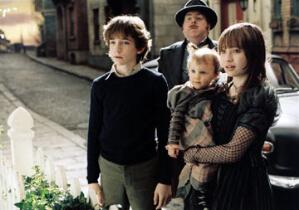Lemony Snicket Movie Is a Good Read
by matthew webber
 When almost everyone I know hates Jim Carrey, how do his movies make any money? In the case of Americaís current number-one movie, Lemony Snicketís A Series of Unfortunate Events, itís because of a built-in fan base of millions of young adult Ė and adult Ė readers. Somewhere between the Harry Potter and Da Vinci Code phenomena, this series of books about the Baudelaire orphans and the unfortunate events that beset them sold briskly enough to make a film adaptation inevitable.
When almost everyone I know hates Jim Carrey, how do his movies make any money? In the case of Americaís current number-one movie, Lemony Snicketís A Series of Unfortunate Events, itís because of a built-in fan base of millions of young adult Ė and adult Ė readers. Somewhere between the Harry Potter and Da Vinci Code phenomena, this series of books about the Baudelaire orphans and the unfortunate events that beset them sold briskly enough to make a film adaptation inevitable.
Likewise, some would say the fact that the orphansí greedy Count Olaf is himself a bad actor made Carreyís casting inevitable, but a Carrey apologist like myself would merely say it makes sense. Carrey has the elasticity of face and the versatility as an actor to pull off these hammy parts. (See Man on the Moon and Eternal Sunshine of the Spotless Mind for proof Carrey can actually act.) Thereís no doubt Lemony Snicket is yet another holiday-season Carrey vehicle, but it differs from the Grinch movie by having other compelling actors. The three kids are funny, plucky, and cute. Meryl Streep brings an estimable heaviness to another silly part.
Itís easy to see why readers, especially young ones, care about the Baudelaire kids: They are exactly the type of precocious characters onto whom smart but shy young readers project themselves. Despite all the misfortune, readers and viewers expect the kids to prevail. After their parents die early in the movie, Violet, Klaus, and Sunny use their inventing, reading, and biting skills to ward off Count Olafís homicidal tendencies (he wants their inheritance money) while being moved from one foster parent to the next. They also have to face ominous scenery that is almost alive in its gothic cartoonishness. Basically, the titular series of unfortunate events tests the kidsí intellect, creativity, and courage. Itís kind of like how smart kids view difficult math problems.
Iím talking a lot about reading, but I havenít read the books. However, these characters are as unabashedly literary as any Wes Anderson (or J.D. Salinger) antihero. I donít know if the adaptation is as literal as some critics have claimed (the same criticism levied against the first two Harry Potter movies), but I believe it can appeal to anybody who loves a good story.
Copyright (c) 2005 erasing clouds |
|